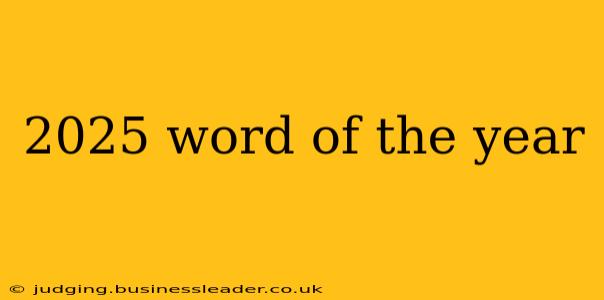2025 Word of the Year: A Crystal Ball Gaze into Linguistic Trends
Predicting the word of the year is a fascinating exercise, a glimpse into the collective consciousness reflected in our language. While no one can definitively declare the winner before its official announcement (usually late in the year), we can analyze current trends and anticipate potential contenders for the coveted title of 2025 Word of the Year. This exploration will go beyond simple speculation, delving into the socio-political climate, technological advancements, and cultural shifts that shape our lexicon.
Several organizations, like Merriam-Webster and Collins Dictionary, meticulously select their word of the year based on a complex algorithm considering frequency of use, cultural relevance, and impact on global conversations. Their choices often reflect significant events, evolving societal values, and emerging technological influences. Let's examine some potential candidates for 2025, keeping in mind that the landscape is constantly evolving.
Potential Contenders and Their Significance:
Several themes consistently emerge when considering potential words of the year. These themes often overlap and intertwine, influencing how we communicate and perceive the world.
1. Sustainability and Environmental Concerns: Words related to climate change, ecological responsibility, and sustainable practices are likely to remain prominent. Candidates could include:
-
Regeneration: This word encompasses the act of renewing or revitalizing something, mirroring the growing focus on ecological restoration and repairing environmental damage. It suggests proactive measures beyond simply mitigating harm.
-
Eco-anxiety: While a slightly longer phrase, the increasing prevalence of eco-anxiety – the distress caused by environmental concerns – could lead to its wider acceptance and use as a single term.
-
Circular Economy: This term, describing an economic model aimed at eliminating waste and the continual use of resources, could gain traction as efforts to transition towards sustainable practices intensify.
2. Technological Advancements and Artificial Intelligence: The rapid pace of technological innovation guarantees a strong presence of tech-related terms. Potential contenders could be:
-
Generative AI: This term accurately captures the transformative power of AI models that generate new content, from text and images to code and music. Its increasing integration into daily life makes it a strong candidate.
-
Metaverse: While the hype has somewhat subsided, the Metaverse continues to evolve, and related terms, or even the term itself, could re-emerge as a prominent descriptor of our evolving digital landscapes.
-
Deepfake: As deepfakes become increasingly sophisticated and more challenging to detect, this term could maintain its relevance, highlighting the ethical and societal implications of advanced AI technologies.
3. Social and Political Change: Major events and evolving societal values will invariably influence the linguistic landscape. Potential candidates here are less predictable but might include words reflecting:
-
Resilience: Facing global challenges, the ability to bounce back from adversity and adapt to change is a crucial quality, making “resilience” a strong potential contender.
-
Solidarity: In an increasingly polarized world, expressions of unity and mutual support might become more prevalent, making “solidarity” a potential candidate.
-
Accountability: The demand for transparency and responsibility across various sectors, from governance to corporate practices, could make “accountability” a powerful word reflecting 2025's social climate.
4. Mental Health and Wellbeing: The growing awareness of mental health is another crucial factor. We could see words reflecting this trend, such as:
-
Self-care: While not a new term, its continued prominence and evolution in meaning could solidify its place as a relevant descriptor of societal values.
-
Mindfulness: Similar to "self-care," mindfulness's ongoing integration into daily life, especially through various practices and applications, could lead to it being selected.
-
Wellbeing: This broader term encompassing physical and mental health could become even more frequently used, especially in discussions about societal progress and individual fulfillment.
Factors Influencing the Word of the Year Selection:
Several elements beyond simple frequency of use influence the ultimate choice. These include:
-
News events: Major global events, from political upheavals to natural disasters, will significantly impact the lexicon.
-
Cultural trends: Emerging trends in art, music, fashion, and popular culture often find expression in language.
-
Technological breakthroughs: Significant advancements in technology invariably introduce new words and phrases into the public consciousness.
-
Social media: The rapid spread of information and trends through social media platforms plays a crucial role in shaping linguistic usage.
Frequently Asked Questions (FAQs):
What is the process for selecting the word of the year? The process varies between organizations. However, it typically involves analyzing vast amounts of linguistic data, considering word frequency, cultural impact, and overall significance.
Who decides the word of the year? Dictionaries and linguistic organizations typically have committees or teams of experts who make the final selection, often based on comprehensive data analysis and expert consensus.
Why is it important to have a word of the year? The word of the year serves as a linguistic snapshot of the year, reflecting the significant events, trends, and cultural shifts that shaped societal discourse. It's a reflection of our collective consciousness expressed through language.
Does the word of the year always reflect positive developments? Not necessarily. The word of the year can reflect both positive and negative aspects of the year, highlighting significant issues and challenges facing society.
How can I influence the word of the year? While you can't directly influence the selection, using and promoting words you believe are significant can contribute to their visibility and potential consideration.
Conclusion:
Predicting the 2025 Word of the Year is an inherently speculative endeavor. However, by examining current trends, anticipating future developments, and understanding the selection criteria of leading linguistic institutions, we can identify potential candidates that reflect the significant issues and transformative events shaping our world. The final selection will undoubtedly be a fascinating reflection of 2025's unique linguistic fingerprint, capturing the essence of a year defined by its challenges and its potential. The chosen word will serve as a linguistic time capsule, encapsulating the hopes, fears, and aspirations of a year poised for significant change.
